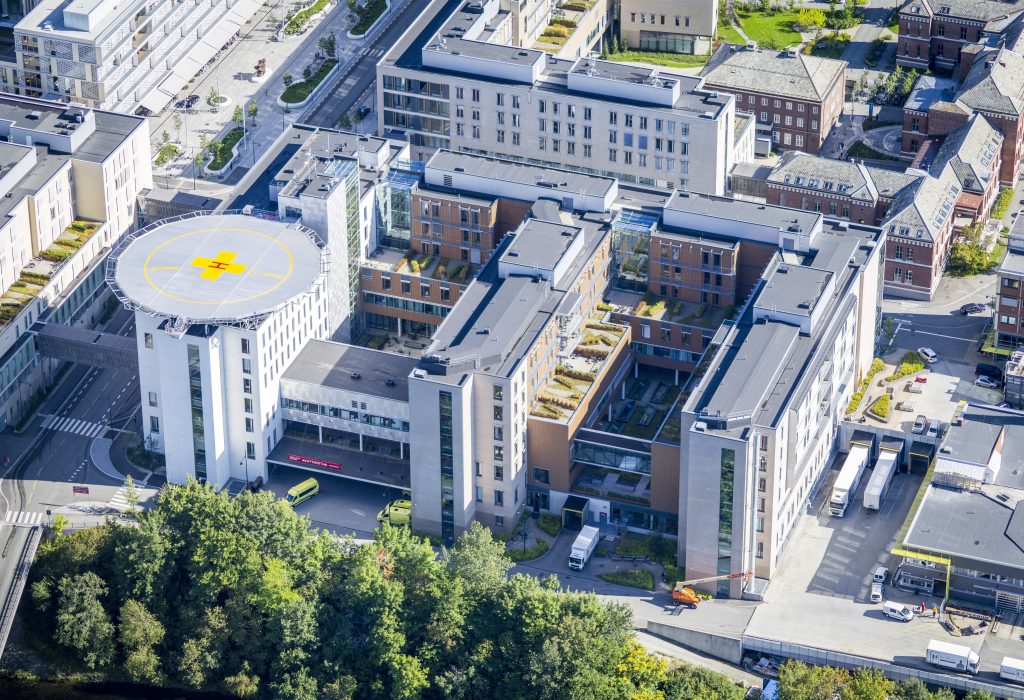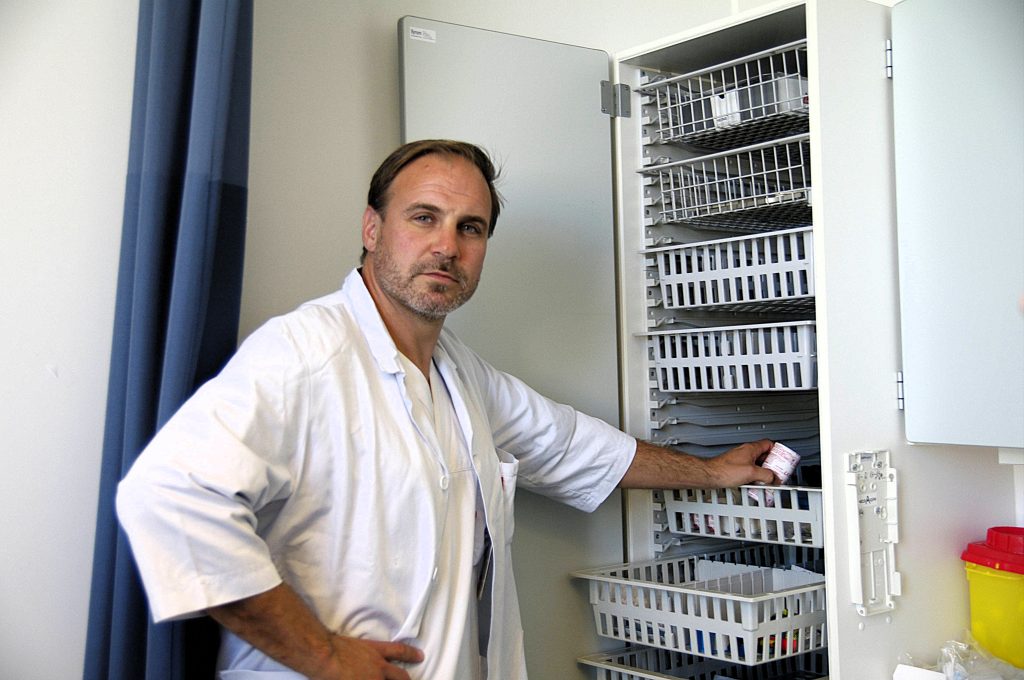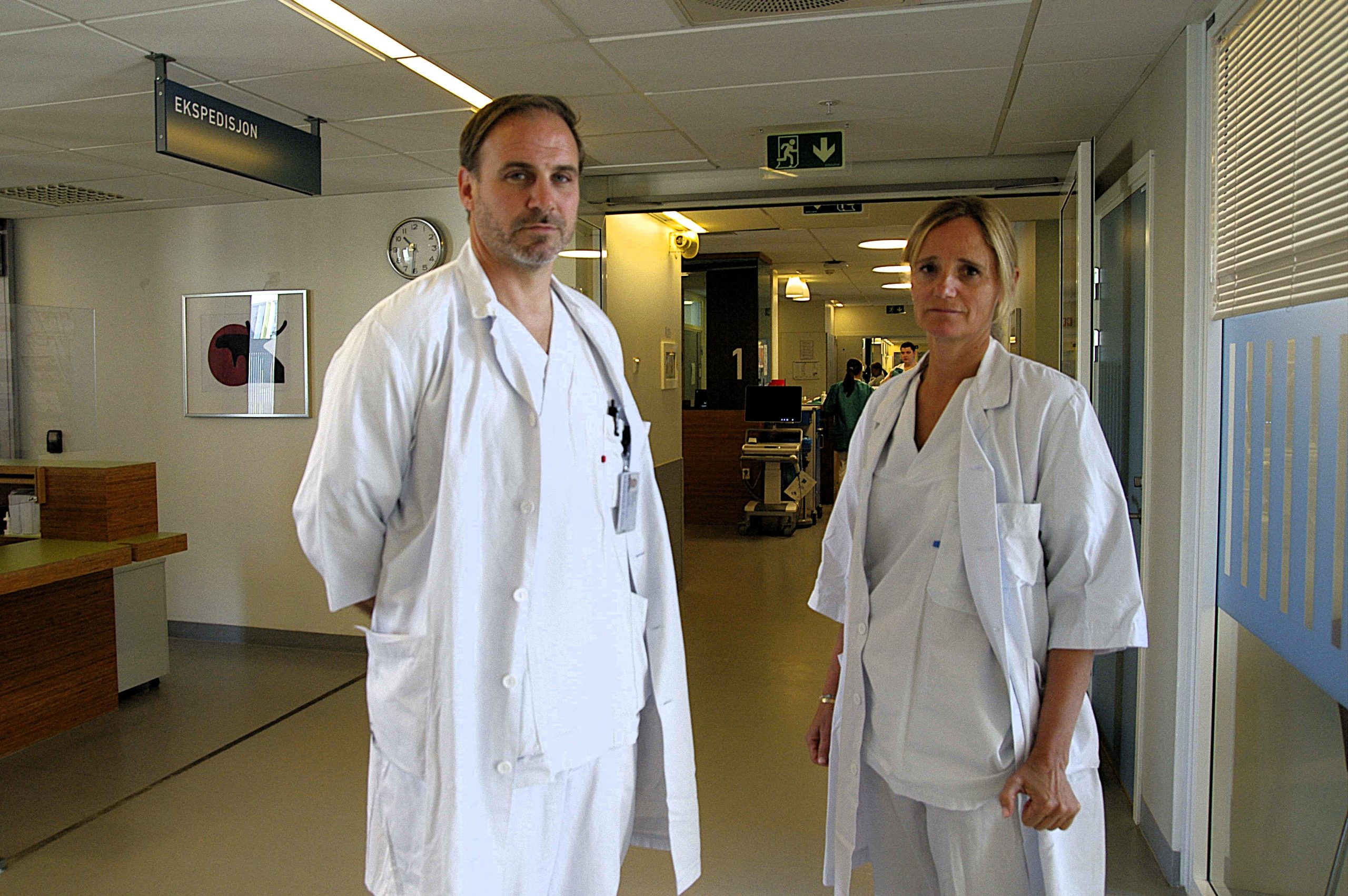Vivi Bakkeheim is the union representative for senior consultants at the Norwegian Association of Senior Hospital Physicians at St. Olavs Hospital in Trondheim.
Bakkeheim is the trade union representative for nearly 50 senior consultants. She says that emergency preparedness and total defence are recurring topics among St. Olavs employees.
St. Olavs Hospital in Trondheim
The hospital has overall responsibility for providing specialist healthcare services to the population of Central Norway.
St. Olavs Hospital serves as the regional hospital for the counties of Trøndelag and Møre og Romsdal, employing around 11,000 people.
Central Norway is a very important part of the country’s military strategy, hosting, among other things, Norway’s main fighter jet base and large stockpiles of Nato military equipment.
A well-prepared health care system is a crucial part of total defence, she argues. The total defence encompasses both Norway’s military forces and civil society’s emergency preparedness.
“Yet the authorities talk too little about the health service as part of preparedness. Healthcare professionals like us are a very important part of total defence, and this should be given more emphasis in the current turbulent times,” she says.
“Doctors and other healthcare professionals are used to facing a variety of situations, and we have seen before that we are good at adapting to rapid change,” she says, alluding to the Covid pandemic.
Feeling the squeeze
Bakkeheim addresses the conditions needed to be able to contribute to preparedness.
“We need sufficient resources to do what is needed and to be properly prepared to face any given situation. The pandemic taught us that we are able to adapt rapidly. That is good.
“Yet we also see that hospitals today do not have the necessary resources in terms of equipment, technology and personnel. We are in a post-pandemic period of austerity,” she explains.
Every day, staff experience what it is like to work in a hospital with limited resources. They also see that this is in stark contrast to the current global security situation.
“We are constantly feeling the squeeze. St Olavs has to save several hundred million kroner this year alone. This is directly at odds with the need for increased preparedness,” she says.
“Twice forgotten”
Bakkeheim and her senior consultant colleagues feel that the healthcare sector has been forgotten in total preparedness planning.
“More investment is needed now, not least to address hospital staffing challenges. The lack of doctors and other professionals is a major problem in several areas. We are struggling to recruit enough people.
“The healthcare system must be better prepared than this to be able to handle potential crises. We don’t see the authorities prioritising healthcare sufficiently in the first place,” she says.
In effect, she feels that hospitals have been “forgotten” twice over – both in preparedness planning and in relation to normal operations.

All St Olavs staff participate in major event exercises like big train or aircraft accident scenarios with many casualties.
But if the hospital trains for major accidents, aren’t you also prepared for war?
“There is something about the scale and duration of a crisis. Hospitals must be more robust to manage more than what we can handle in day-to-day operations today. Instead of making healthcare a core part of overall preparedness, hospitals are deeply in debt and forced to cut costs,” she reiterates.
“Not enough equipment”
Senior consultant Sivert Hammer is a colleague of Bakkeheim. He also notes that the hospital conducts exercises and has good knowledge of handling major accidents.
“But the hospital doesn’t hold exercises for war or invasion-related catastrophes where we would have to handle a large number of patients over time. We also lack a lot of equipment to manage such a situation,” he says.
Hammer is the union representative at the hospital’s orthopaedic clinic.

“I am an orthopaedic surgeon, and broken arms and legs are the most common types of damage in a war. The hospital depends on emergency equipment in such a situation.
“In Norway, we are not very well equipped for that in terms of having the latest tools. There is not a lot of spare equipment in storage either,” explains Hammer.
He compares the situation in Norway with that in other countries.
“Germany and Finland, for instance, are way ahead with more up-to-date equipment and bigger reserves. However, they are also closer to the border of a potential war,” he says.
Not prepared
The Office of the Auditor General of Norway believes that civilian actors are inadequately prepared for war, given the current security situation in Europe. It says that the healthcare system is not sufficiently prepared to support the armed forces.
Norway’s Office of the Auditor General about total defence
Norway’s Office of the Auditor General has examined the total defence at local and regional levels during the period 2020 – 2024.
The review follows the Norwegian parliament’s 2016 decision to strengthen the total defence system. Nevertheless, the Auditor General concluded that the Government has not done enough to ensure a well-functioning total defence.
Key findings include:
- Civilian actors are not sufficiently prepared to support the armed forces and allied forces.
- Municipalities have received insufficient information about preparedness and are unclear about what they need to do to support the armed forces in a crisis.
- There has been inadequate follow-up, even when challenges have been known for a long time.
- Several ministries have failed to implement necessary changes.
- Plans for civilian evacuation are lacking.
- Municipalities do little planning for crises and war.
- Reviews carry on and take too long.
- Municipalities want clear guidance.
- It is unclear what resources are available in crises and war.
A separate report from the “Healthcare Personnel Commission” states that the healthcare system could collapse if it continues to operate as it does today.
“All the civilian actors interviewed by the Auditor General said it was unclear what the armed forces would need from them in a crisis or war situation,” said Auditor General Karl Eirik Schjøtt-Pedersen when the report was presented in the spring, according to the Norwegian News Agency NTB.
Will map the needs
Karl Kristian Bekeng (Labour) is a state secretary at the Ministry of Health and Care Services. He refers to the “Total Preparedness Report 2024 – 2025”, which outlines the restructuring of the civilian part of the total defence and civilian resilience.
“The report states that the population must receive healthcare and social services during war, while the health services must also support national and allied military forces.
“The regional health authorities are responsible for having preparedness plans for war and crises, including plans for prioritising healthcare personnel,” Bekeng explains.

He makes no promises of additional funding.
“Hospitals must map capacity and preparedness needs. The Committee for Civil-Military Health Preparedness Cooperation also helps to coordinate healthcare preparedness.
“The committee is tasked with supporting the health and care sector’s ability to maintain Norway’s defence capabilities and assist the armed forces during war. It includes representatives from both civilian and military sectors as well as the healthcare system,” he tells the Nordic Labour Journal.
It is not known how long the mapping will take.
Learning from Ukraine
This summer, Norway and Ukraine signed a health partnership agreement.
“A healthcare collaboration is mutually beneficial for Norway and Ukraine. We can learn a great deal from Ukraine in areas such as organising health services during war, civil-military cooperation, and the use of technology.
“From Norway’s side, we can assist Ukraine in areas like mental health, rehabilitation, and antimicrobial resistance,” says Minister of Health and Care Services Jan Christian Vestre (Labour).
“We cannot be naïve. We must learn, and we must also prepare for unimaginable scenarios.
As the Prime Minister has said, Norway must be prepared to be affected by war. That is why I believe it is crucial that we use what the Ukrainians have learned, to inform our own planning,” Vestre tells the newspaper VG.
The health partnership agreement covers areas such as cybersecurity in the health sector, healthcare preparedness, and medical evacuation.
“It is deeply moving to see the extensive consequences of Russia’s brutal attacks and how the Ukrainian healthcare system is providing an impressive effort under extremely challenging conditions,” the minister adds.
Underground hospitals
There are also high-level discussions about preparedness in Finland. Currently, Finnish hospitals are not prepared to cope with attacks like those Russia is carrying out in Ukraine. This must be taken into account when building new hospitals, writes the Finnish daily Hufvudstadsbladet.
There is also a debate about whether Finland should build hospitals partially underground, similar to facilities in Narvik in Norway and Kiruna in Sweden.
Finland’s Minister of Family and Social Affairs Sanni Grahn-Laasonen (National Coalition Party) has said that Finland must do everything possible to protect the critical functions of hospitals, and that the risk of war must be considered when hospitals are built or renovated.





